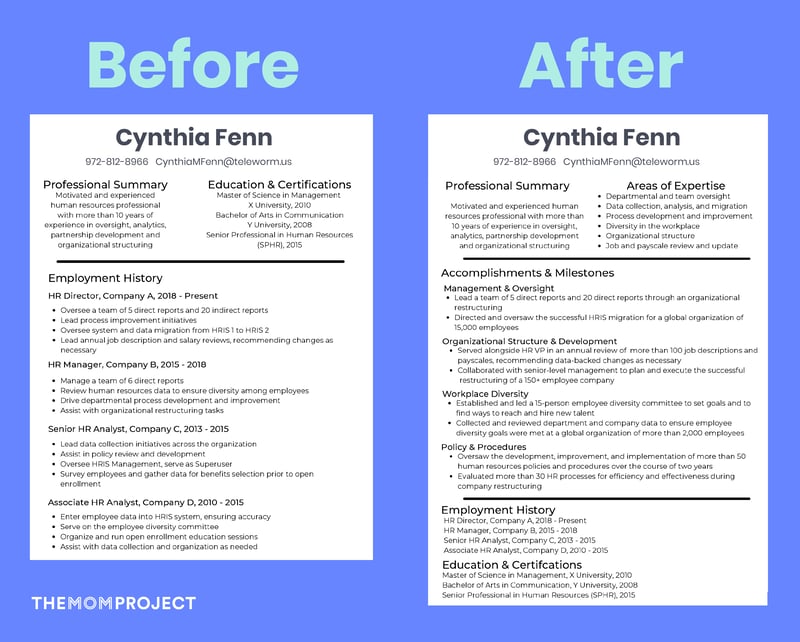A job description is typically formatted as a list of tasks you would be responsible for doing if you were to take the position. A resume, however, is meant to be a snapshot of your expertise and professional development, so it should not read like a job description with bullet lists of responsibilities. Instead, it should be a highlight reel that showcases major milestones and achievements over the course of a career.
Unfortunately, a lot of resumes are not written this way. By focusing on tasks instead of accomplishments, you’re selling yourself and your abilities short and putting yourself at a disadvantage while job searching.

Interview and resume expert, Ashley Cash, tells The Mom Project, “Tasks tell the reader what you did, accomplishments tell [them] why they should care.” She further explains that a resume should be written so that the person reviewing it can clearly see that you are able to “solve their problem (i.e. do the job they are hiring for),” and the best way to do that is to give examples of ways you’ve done something similar in the past.
Why highlight accomplishments?
Think of your resume as a sales pitch. You’re trying to market your skills and expertise so well that an employer wants to invest in and pay you for them. Showcasing specific ways you’ve helped other “clients” (employers) reach their goals is going to be a much better selling point than a list of things you’re expected to do.
That’s not to say you have to delete every single responsibility from your resume. Cash, who has helped clients land jobs at companies including Facebook, Nike and Top Golf, says, “It’s a good idea to summarize your key/main responsibility areas just to show the breadth of your capabilities.” However, she emphasizes the importance of summarizing your responsibilities and focusing on the ones “that are most relevant to the job you’re applying for” because those are the ones the “hiring manager cares about.”
▶️ Watch: Career coach and resume expert Ashley Cash discusses how to write and format a resume that will stand out from the crowd. Watch now
Responsibility vs. Achievement
A responsibility is essentially a duty that you are expected to perform in your job. An achievement, however, is the result you produced from successfully doing that duty. The most commonly used accomplishments are the ones with quantifiable results because numbers tend to stand out on a resume.
If you know some of the data surrounding your work, you can turn your responsibility bullet point into an accomplishment:
🚫 Instead of: Reviewed and made changes to department policies and procedures
✅ Try: Collaborated with senior management in evaluating, improving and implementing more than 50 departmental policies and procedures for efficacy and efficiency in 2019
The second bullet is a much more accurate reflection of your skills and experience than the first, which leaves the hiring manager to make assumptions. According to Cash, it’s really important to spell things out for the person reviewing your resume because “decision makers are extremely literal when reading resumes. They don't make inferences, read between the lines, or dig too deeply for relevant information.”
If you don’t have quantifiable accomplishments
If you don’t have any quantifiable accomplishments, Cash says that’s okay because you likely still have something to work with. “You can use words like ‘increased,’ ‘decreased,’ [and] ‘supported’ to talk about the impact of your work.”
Here’s an example bullet she says would work for a “mostly administrative” role:
“Provide administrative support for a $3M business unit”
Additionally, she notes “qualitative data counts, too!” Even if you don’t have a number to associate with a responsibility, you should still include it on your resume.
She gave the example:
“Created processes to improve customer service”
Tips for writing out bullet points that focus on accomplishments
Cash’s quick and easy method for writing an accomplishment bullet point is to use the “and then what happened test.” To do this, she says, “Look at each bullet on your resume and ask yourself, "and then what happened?" then, “Connect your existing bullet and your ‘and then what happened’ using a power verb like ‘created’ or ‘increased.’”
🚫 Instead of: Responsible for creating digital marketing campaigns
✅ Try: Created digital marketing campaigns that increased web traffic by 10%
For more ideas, here are two resumes, the “before” version focuses on responsibilities, and the “after” highlights achievements:

Reframing non-traditional work
If you’ve done a lot of volunteer work, don’t be afraid to also include achievements from it in your resume. Even if it wasn’t in a traditional work environment you still took on a project and produced results, and those results are what will help set you apart from fellow job candidates. The major thing to remember here is to give these accomplishments the same authority as those from more traditional work. Don’t downplay your hard work!
🚫 Instead of: Served as PTA Treasurer
✅ Try: Managed more than $25,000 in PTA funds, administered bi-weekly audits and prepared and distributed quarterly financial reports
Both of these statements are true, but the second is a much more accurate overview of the job and has quantifiable data. It demonstrates your experience in financial management and paints a picture of what the job actually entails, whereas the first statement could be perceived as an empty title.
It’s all about marketing
Remember, the purpose of your resume is to get a recruiter or hiring manager’s attention and to market yourself as a candidate. You want that single piece of paper to help you convince someone to pay for your skills, and the best way to do that is by proving that you can get the job done. Your accomplishments don’t need to be flashy to impress someone, they just need to show that you’re able to meet (or exceed) expectations and deliver results. Writing your resume to highlight your accomplishments allows you to give yourself and your work the credit they deserve.
Find more career search resources
The Mom Project believes in the future of a better workplace for everyone and we are providing resources for every step of that journey. To find more, 



